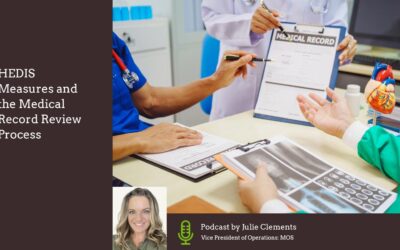If you’re an attorney seeking cardiology medical records for legal purposes, it’s essential to follow a set of best practices. With our expertise, MOS efficiently manage large-scale medical record collections using a skilled and experienced chart retrieval team, supported by a state-of-the-art software system designed for optimal efficiency and accuracy. Benefit from rapid medical record retrieval services with us.
In this podcast, Jessica Schwartz, one of our Solutions Managers, discusses best practices for streamlining cardiology medical record retrieval.
Podcast Highlights
00:21 Tips to Optimize Medical Record Retrieval
Streamlining Cardiology Medical Record Retrieval
Read Transcript
When it comes to cardiology medical record retrieval for attorneys for legal use, there are several best practices to consider. These practices can help ensure that the medical records obtained are accurate, complete, and suitable for legal purposes.
00:21 Tips to Optimize Medical Record Retrieval
Here are 20 tips.
- Engage a qualified medical record retrieval service: Consider partnering with a reputable medical record retrieval service that specializes in gathering medical records for legal cases. They can navigate the complexities of medical record retrieval, ensure compliance with privacy regulations, and provide the necessary expertise.
- Clearly define the scope and purpose: Clearly communicate the specific requirements and purpose of the medical record retrieval to the service provider. This includes identifying the relevant time period, specific medical conditions, treatments, procedures, and any other pertinent details.
- Obtain necessary authorization: Ensure that the attorney has appropriate authorization from the client or the court to request and access the medical records. The authorization should comply with all relevant legal and privacy requirements, such as HIPAA in the United States.
- Provide detailed instructions: Clearly communicate the required format, organization, and specific documents needed. For cardiology cases, this may include electrocardiograms (ECGs/EKGs), stress test results, operative reports, consultation notes, and more.
- Specify preferred delivery format: Inform the medical record retrieval service about the desired format for the records, such as electronic copies in PDF or TIFF format, or hard copies. Consider the convenience of digital formats for ease of sharing, storage, and searchability.
- Ensure compliance with privacy regulations: Confirm that the medical review company follows strict privacy protocols to protect the confidentiality of patient information. This includes secure storage, transmission, and disposal of records, as well as compliance with applicable data protection laws.
- Validate the authenticity of records: Request the retrieval service to provide information on how they authenticate and verify the medical records obtained. This may involve confirming the source, integrity, and accuracy of the records to support their admissibility in legal proceedings.
- Maintain a detailed record log: Keep a comprehensive record log of all medical record retrieval activities. This log should include dates, communications, and interactions with the retrieval service, documents requested, and any other relevant information for future reference.
- Review and analyze the records thoroughly: Carefully review the retrieved medical records for accuracy, completeness, and relevance to the case at hand. Seek expert medical opinions, if necessary interpret complex cardiology-related information accurately.
- Ensure compliance with legal and procedural requirements: Familiarize yourself with the specific legal requirements, deadlines, and rules governing the use of medical records in your jurisdiction. Adhere to these requirements to ensure the records are appropriately used in legal proceedings.
- Identify key healthcare providers: Determine the healthcare providers involved in the cardiology treatment and care of the patient. This may include primary care physicians, cardiologists, hospitals, clinics, and any other relevant specialists. Gathering records from all relevant providers ensures a comprehensive view of the patient’s medical history.
- Request all relevant documentation: Consider requesting other relevant documentation that may support the case. This could include medication records, prescription orders, and some more.
- Be aware of record retention policies: Different healthcare providers have varying policies regarding the retention of medical records. Ensure that records are requested within the appropriate timeframe to avoid any potential loss of relevant information due to record purging.
- Consider obtaining imaging studies: Imaging studies such as CT scans, MRIs, and so on can provide valuable visual evidence. Work with the medical record retrieval service to obtain these images in the DICOM format, along with accompanying radiology reports.
- Collaborate with medical experts: Engage the services of medical experts, such as cardiologists or other specialists, to help review and interpret the retrieved medical records. These experts can provide insights, opinions, and expert testimony to support the legal arguments in the case.
- Maintain organized records: Once the medical records are obtained, ensure they are organized and indexed in a logical manner. Use appropriate document management software or systems to facilitate easy access and retrieval of specific records when needed.
- Prepare a medical chronology or timeline: This can help attorneys and experts understand the sequence of events and identify any potential deviations from the standard of care.
- Seek clarification and follow-up: If certain records are incomplete, illegible, or require clarification, reach out to the healthcare provider or retrieval service to address these issues.
- Consider depositions and witness preparation: As part of the legal process, depositions may be conducted with healthcare providers involved in the case. Prepare thoroughly by reviewing the medical records in detail, identifying inconsistencies or gaps, and formulating relevant questions to obtain valuable testimony.
- Adhere to legal and ethical obligations: Ensure that all medical records obtained are used strictly for legal purposes and treated with confidentiality and discretion. Comply with legal and ethical obligations to safeguard patient privacy and protect sensitive medical information.
Remember that these guidelines provide general recommendations, and legal requirements and practices can vary depending on your jurisdiction. Consult with professionals experienced in medical record retrieval and healthcare law for specific guidance tailored to your needs.
Thank you for listening! Have a good day!



